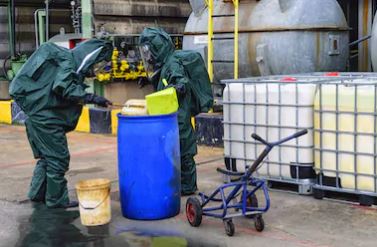We use cookies to make your experience better. To comply with the new e-Privacy directive, we need to ask for your consent to set the cookies. Learn more.
Can you afford to risk a chemical spill?

Asking how much a chemical spill could cost your business is somewhat like asking how long is a piece of string. The quick answer is that it’s probably a lot more than you would think and isn't just a monetary cost. So can you afford to risk a chemical spill? No-one can.
Sometimes we talk to organisations which are trying to control their costs and wondering whether spill prevention and control solutions are something they need to be budgeting for. They will argue that the risk of a spill is minimal or that they will act if it happens, expecting the costs to be a manageable one-off hit on their bottom line. They don’t realise that the costs of a spill can very quickly escalate and that fines can run into millions.
Firstly, there’s the direct cost of the clean-up, including all the consumables and repairing the damage. Depending on the scale, or the materials involved, you may need specialist help. You could end up facing bills from contractors, the Environment Agency, the Fire Service or the Health and Safety Executive.
In addition to the direct costs of a clean-up, there are other things to consider.
- If your staff are in any way injured by the event, sick pay or compensation may be payable.
- Business could be interrupted, leading to lost orders or contracts that aren’t renewed.
- Your hard-won reputation could be severely impacted and you could face a lot of negative publicity.
The cereal giant Weetabix was hit by a stiff fine at the end of 2019 which was widely reported in the mainstream press, resulting in damage to their brand name.
Insurance claims could cover some of the costs, but the effect on your premiums or ability to get cover could be harmed, if you were deemed to have been negligent. The strongest penalties are handed out by the courts when a business is judged to have been in a position to avoid a spill. Thames Water faced fines of £20m relating to six river pollution incidents which were avoidable.
Chemical spills cause more damage than fines
Damage caused is so much more than a monetary value. The cost to wildlife and the environment can be devastating.In 2014, a company was fined £160k plus costs for pollution. Thousands of fish were killed as a result of ammonia-contaminated water leaking into a surface water drain and on into a local brook.
A successful prosecution by the Environment Agency in 2021 handed a water company a £300,000 fine. They found 3 water pumps had failed after a fire, resulting in an ammonia leak and over 5000 fish dying.
Despite the fines - and there is a possibility of jail terms - bodies such as the Environment Agency aren’t the enemy. They’re a great resource when there’s an issue that needs resolving and their expertise can help minimise any damage. Remember is that attitude is critical. A business that has failed to take its responsibilities seriously will face the most serious and damaging consequences.
So how long is that piece of string? Well, a small incident could cost a few thousand pounds to deal with. A large one or a repeated one could cost millions and cripple a business. So can you afford to risk a chemical spill? It’s vital to understand the risks, to minimise them and have plans and resources in place to deal with any spillage.
You May Also be Interested In:
-

Site Survey
We assess your site, equipment, and spill training procedures, highlighting any potential danger zones that are apparent on site.
Read More -

Spill Training
Spill training courses designed to ensure your team are fully compliant and confident to prevent and deal with any spill incident.
Read More -

Managed Spill Service
A complete solution that we manage on your behalf, providing appropriate spill products with a regular audit and replenishment service
Read More -

Spill Equipment
Wide range of equipment to help prevent or respond to spills safely. Including safe storage, trollies, spill kits, PPE and much more
Read More

